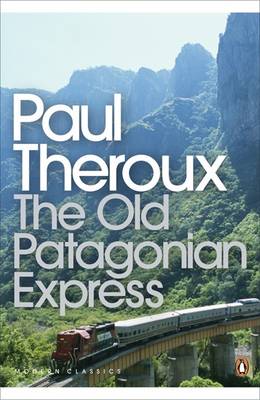
For one of the most recognized travel writers ever, Paul Theroux doesn't seem to go in much for the genre. His 1979 account of riding the rails all the way from Medford, Massachusetts to Esquel, Argentina is loaded with disdain for travel-writings conventions and expected pieties.
"The literature of travel has become measly," he tells us close to the beginning. "The joke opening, that straining for effect, is now so familiar it is nearly impossible to parody...What interests me is the waking in the morning, the progress from the familiar to the slightly odd, to the rather strange, to the totally foreign, and finally to the outlandish. The journey, not the arrival, matters; the voyage, not the landing."
The Old Patagonian Express provides a diverting, illuminating, and at times quite moving reading experience, precisely because of Theroux's refusal to get sentimental about what he sees and hears. The grinding poverty of Latin America makes a deep impression, as does the hopeless teetering of most of its countries between anarchy and tyranny. But he's never after a specific feeling from the reader.
The journey begins just outside Boston, as Theroux steps on a commuter train in the midst of a fierce winter (from Theroux's account this seems to have been right around the time of the Great Blizzard of February, 1978 which shut down most of New England and parts beyond) to take on a project he had been contemplated during two years of being stuck inside writing fiction. While reviewing maps, he had discovered a "continuous track" extending all the way nearly from his home to near the tip of South America's Patagonian coast. A fluent Spanish speaker and experienced traveler, Theroux figures why not give it a go?
 |
| The Old Patagonian Express rumbles down the line somewhere in Chubut Province, Argentina. Image from https://www.pinterest.ca/pin/56506170311717698/ |
Yet he travels in a part of the world, once he passes over the Rio Grande into Mexico, where he is warned about fragile sensitivities. "Don't criticize them - they hate to be criticized." is a common caution as Theroux goes from Mexico south to Guatemala, Costa Rica, Venezuela, Peru, and eventually Argentina, not to mention other countries on the way. It's a bit dicey at times having such a seemingly outspoken man in such a part of the world.
Theroux sees much to criticize. The standard of living is unbearably low. Children live like dogs on the streets, while the stronger dogs prey on the unwary. In Mexico he describes rickety shacks, "many three-walled houses without roofs" where thousands live in the town of Las Cabañas. He quotes a Mexican on the same train: "Cabañas are pretty and pleasant. You sit there and have nice cool drinks. That is why they call them - cabañas. And they call this filthy place Cabañas?"
This becomes one of the many subthemes of Old Patagonian Express, how ill-fitting the place names can be. Theroux makes much of this, "no progress in Progreso, no ranches in Rancho." He suggests a cartographer with a heavy sense of irony.
Yet there is much beauty and wonder on display, too. The green flanks and swift-flowing rivers of Costa Rica impress Theroux, as does the vast desert of Patagonia when he finally reaches it. Riding the rail line to the Peruvian Andes Theroux finds the train riding so high he feels himself literally riding in the clouds, literally becoming ill from the experience.
 |
| Author Paul Theroux. Image from https://dauntlessjaunter.com/paul-theroux-old-patagonian-express/ |
The train ride doesn't prove to be as continuous as Theroux imagined. He actually has to get off in places, like where the land mass is broken up by the world's busiest canal, or, in the case of Nicaragua, re-evaluate his plans in the wake of an ongoing revolution. Often he asks himself why he is doing this. Theroux's tendency to self-doubt is actually rather engaging; he can be frustrating but he's never boring.
There's a self-involvement about The Old Patagonian Express some readers may find off-putting. But his frank, no-apologies approach to his craft makes him a worthy successor here to the great travel writers of yore, like Evelyn Waugh and James Boswell.
No comments:
Post a Comment